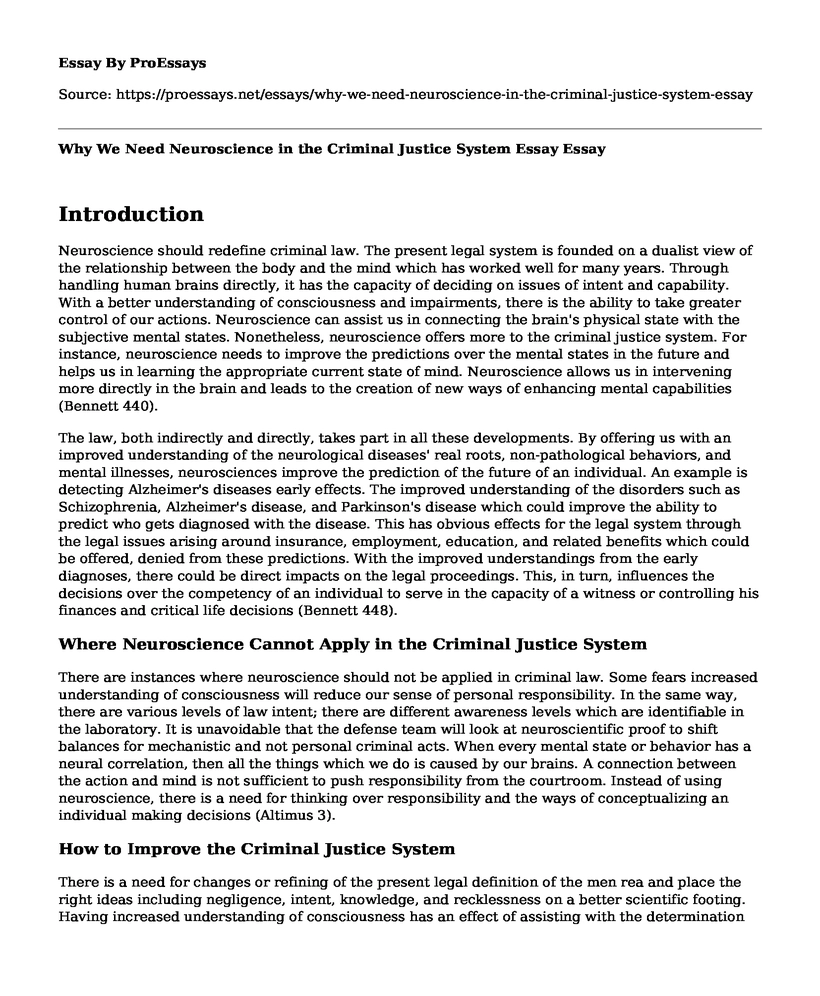Introduction
Neuroscience should redefine criminal law. The present legal system is founded on a dualist view of the relationship between the body and the mind which has worked well for many years. Through handling human brains directly, it has the capacity of deciding on issues of intent and capability. With a better understanding of consciousness and impairments, there is the ability to take greater control of our actions. Neuroscience can assist us in connecting the brain's physical state with the subjective mental states. Nonetheless, neuroscience offers more to the criminal justice system. For instance, neuroscience needs to improve the predictions over the mental states in the future and helps us in learning the appropriate current state of mind. Neuroscience allows us in intervening more directly in the brain and leads to the creation of new ways of enhancing mental capabilities (Bennett 440).
The law, both indirectly and directly, takes part in all these developments. By offering us with an improved understanding of the neurological diseases' real roots, non-pathological behaviors, and mental illnesses, neurosciences improve the prediction of the future of an individual. An example is detecting Alzheimer's diseases early effects. The improved understanding of the disorders such as Schizophrenia, Alzheimer's disease, and Parkinson's disease which could improve the ability to predict who gets diagnosed with the disease. This has obvious effects for the legal system through the legal issues arising around insurance, employment, education, and related benefits which could be offered, denied from these predictions. With the improved understandings from the early diagnoses, there could be direct impacts on the legal proceedings. This, in turn, influences the decisions over the competency of an individual to serve in the capacity of a witness or controlling his finances and critical life decisions (Bennett 448).
Where Neuroscience Cannot Apply in the Criminal Justice System
There are instances where neuroscience should not be applied in criminal law. Some fears increased understanding of consciousness will reduce our sense of personal responsibility. In the same way, there are various levels of law intent; there are different awareness levels which are identifiable in the laboratory. It is unavoidable that the defense team will look at neuroscientific proof to shift balances for mechanistic and not personal criminal acts. When every mental state or behavior has a neural correlation, then all the things which we do is caused by our brains. A connection between the action and mind is not sufficient to push responsibility from the courtroom. Instead of using neuroscience, there is a need for thinking over responsibility and the ways of conceptualizing an individual making decisions (Altimus 3).
How to Improve the Criminal Justice System
There is a need for changes or refining of the present legal definition of the men rea and place the right ideas including negligence, intent, knowledge, and recklessness on a better scientific footing. Having increased understanding of consciousness has an effect of assisting with the determination of the intent levels of specific crimes and navigating the boundaries between unconscious and conscious actions and decisions respectively (Greely 1103). Currently, the criminal justice system faces serious challenges. Many studies in cognitive neuroscience are dependent on averaging together different people. This allows us to understand the typical or average brain. However, it does not follow that everyone in the group is ideal. Even when this problem is solved, it will not assist in the adjudication of the case when the consciousness is intact.
Works Cited
Altimus, Cara M. "Neuroscience Has the Power to Change the Criminal Justice System." eNeuro 3.6 (2016).
Bennett, Elizabeth. "Neuroscience and Criminal Law: Have We Been Getting It Wrong for Centuries and Where Do We Go from Here." Fordham L. Rev. 85 (2016): 437.
Greely, Henry T. "Neuroscience and criminal justice: not responsibility but treatment." U. Kan. L. Rev. 56 (2007): 1103.
Cite this page
Why We Need Neuroscience in the Criminal Justice System Essay. (2022, Feb 22). Retrieved from https://proessays.net/essays/why-we-need-neuroscience-in-the-criminal-justice-system-essay
If you are the original author of this essay and no longer wish to have it published on the ProEssays website, please click below to request its removal:
- Essay Example on Criminology Schools
- Essay on the Gun Control Issue in the United States
- Paper Example on Occupational Crime: Joel Morehu-Barlow "The Tahitian Prince"
- Children Left Behind: Effects of Incarceration on Children Paper Example
- Summary of Legislation in Juvenile Crime Essay Example
- Civil and Alternate Dispute Resolution Process Essay
- Equifax Company Case Study







